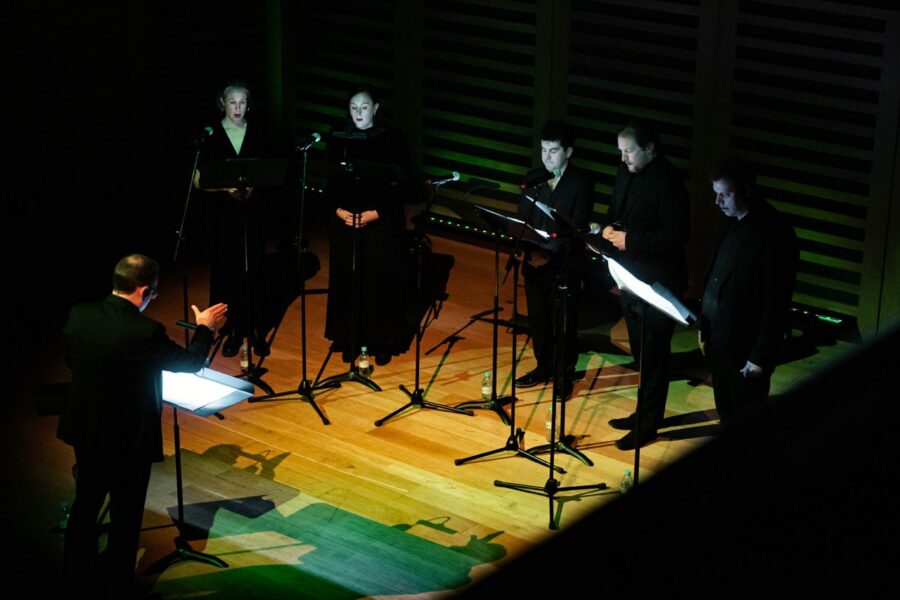What Is Russia Thinking? A ‘Documentary Opera’ Tries to Answer. New York Times, February 15th, 2023. By Andrew Dickson. Images by Anton Mostovenko.
“I thought it would be a useful thing to give voice to people who are not typically in the Russian press, or aren’t reachable by Western journalists,” the composer Eugene Birman said. “Russia: Today,” a piece by the composer Eugene Birman, is based on hundreds of interviews with hundreds of Russians, in which they share their private feelings about the country. February 15, 2023
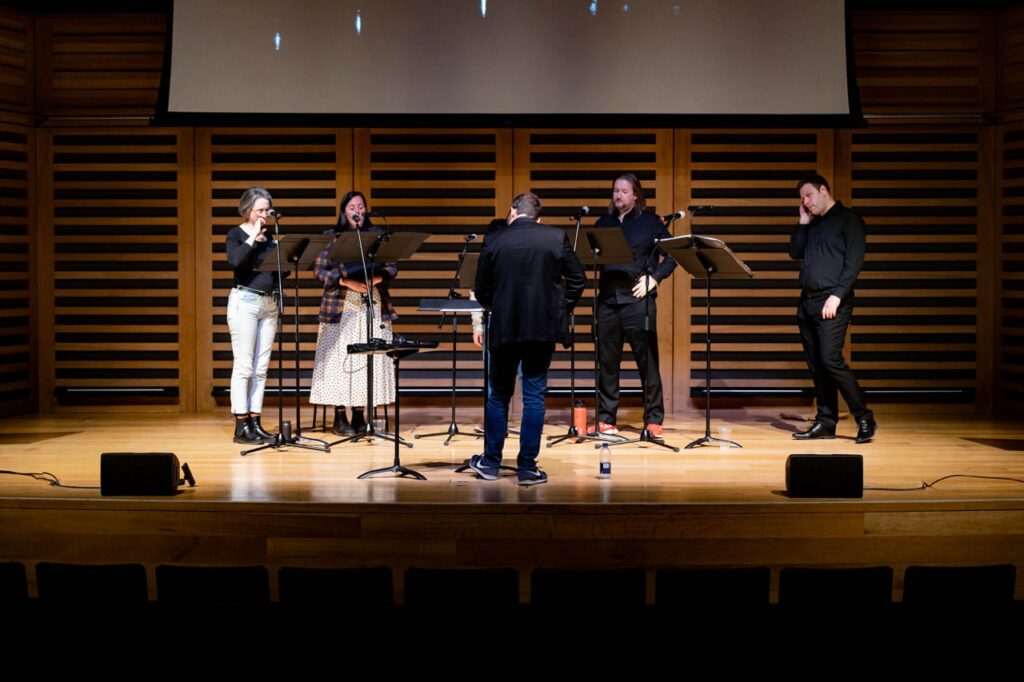
Many things have been said about Russia since the country launched a full-scale invasion of Ukraine a year ago. But getting a sense of what Russian citizens privately feel about their nation is hard: State news outlets are more strident than ever and independent ones have been closed down. Western reporters still working there are treated with suspicion or fear. Unlikely as it might seem, a new “documentary opera” is attempting to cut through the noise to find something approaching the truth. Called “Russia: Today” — the title is a wry nod to the propaganda-spouting, Kremlin-funded media company, now known as RT — the piece, by the Russian-born, Hong Kong-based composer Eugene Birman, is assembled from hundreds of interviews with Russian citizens, people of Russian heritage and people who live in neighbouring countries, conducted over the last few years. On Thursday, the piece receives a rare performance at Kings Place, a London concert hall, after an aborted attempt to premiere it in Moscow and a controversial first outing in Estonia, near the border with Russia.
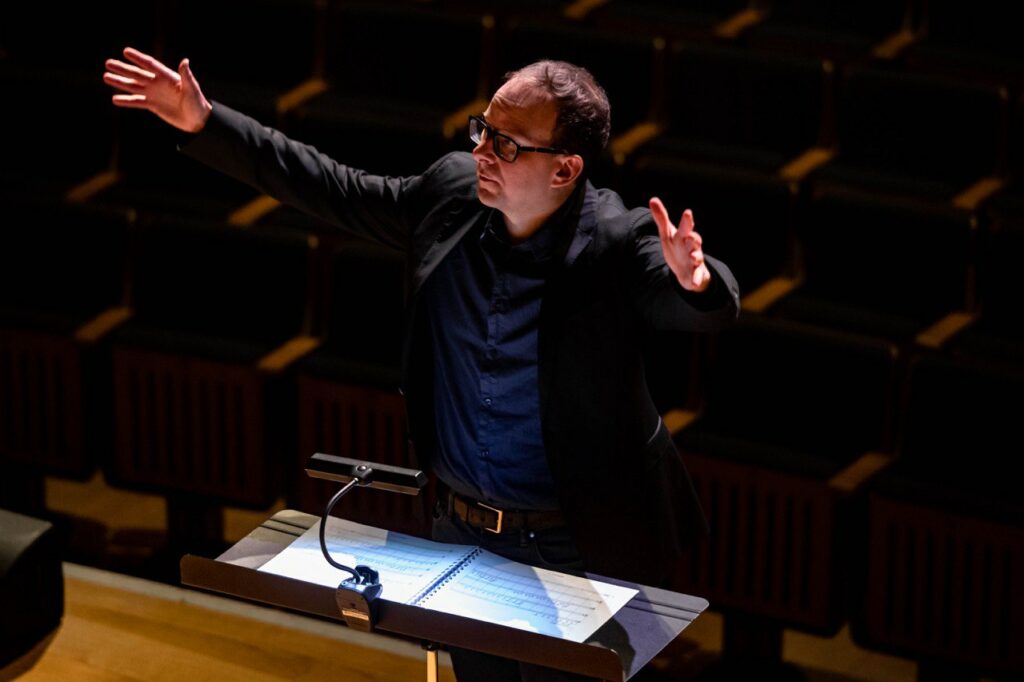
A collage of recorded testimony, new music and chant inspired by Orthodox liturgical practice, “Russia: Today” tries to open a window into Russia’s psyche — exactly when many people outside are wondering what’s on its mind. “I thought it would be a useful thing to give voice to people who are not typically in the Russian press, or aren’t reachable by Western journalists,” Birman said. “The idea is to let people’s words speak for themselves.”
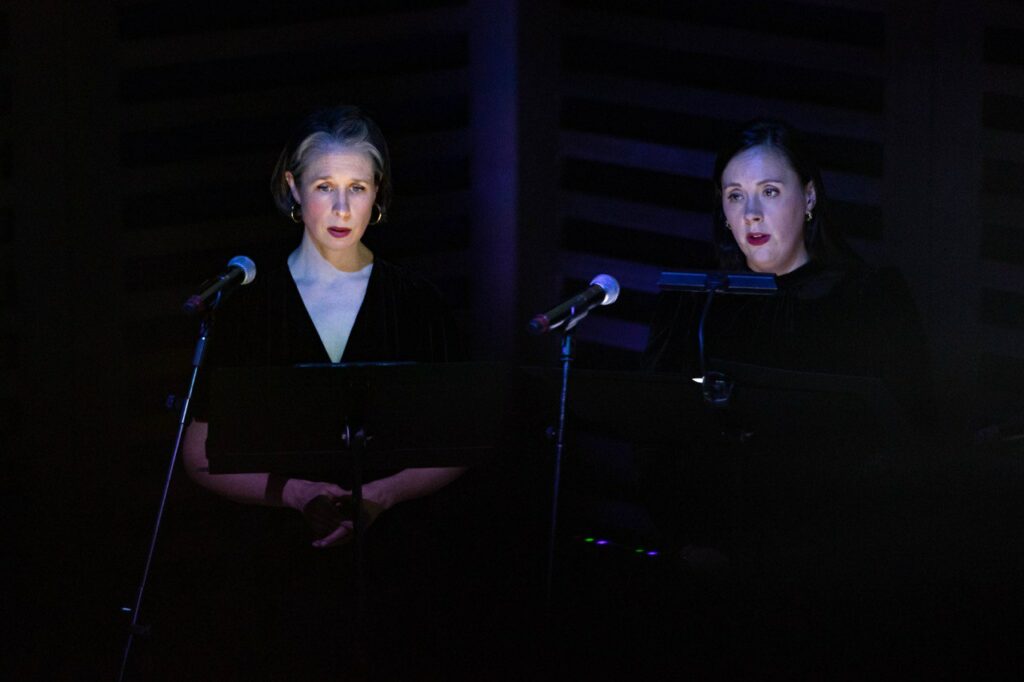
Topical though “Russia: Today” seems, it dates from before Russia’s invasion of Ukraine last year. Yet the themes it explores — post-Soviet nostalgia, uncertainty about Russia’s place in the world, anxiety about escalating conflict — seem eerily prescient. At one point, we hear a woman describing Russia as “a huge broken freezer: ripe bananas and rotten tomatoes.” Someone else brusquely compares the country to a “fat kid at a birthday party who everyone makes fun of” — until “he explodes.” Yet there are notes of optimism too. Another voice suggests that, while Russia is “a mess” right now, there is “hope for change.”
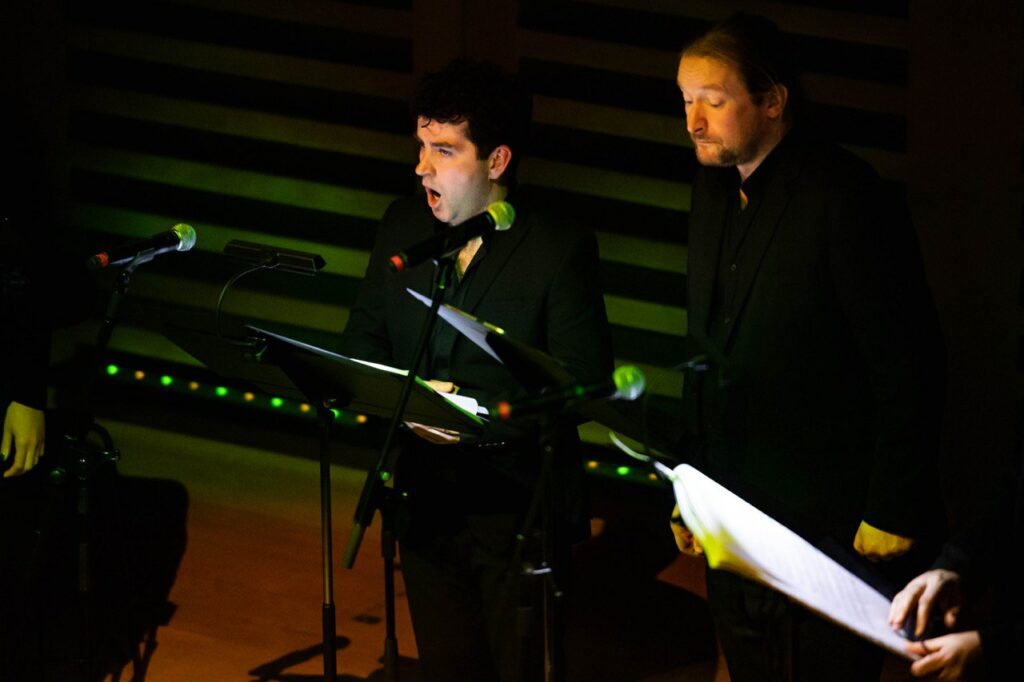
In 2017, when the dust was still settling on Russia’s annexation of Crimea, Birman was invited on a European Union-funded program to encourage cultural dialogue between artists from Eastern and Western Europe. For that project, he staged a series of workshops in Riga, Latvia — a city with a large ethnic Russian population. Birman set up a sound booth inside an arts center there and invited anyone who stepped inside to anonymously record their thoughts on Russia’s past, present and future. “There was a queue out the door,” Birman said. “One person spoke for, like, 30 minutes.” To capture a wider range of perspectives, the production team also set up recording booths in Helsinki, Finland, and Vladivostok, Russia, in 2018 and 2019, collecting hundreds more pieces of testimony. These were transcribed and pieced together into a libretto by the writer Scott Diel, with whom Birman has collaborated on other verbatim projects. (Those include the 2013 cantata “Nostra Culpa,” which was based on a Twitter tussle between the Times Op-Ed columnist Paul Krugman and Toomas Hendrik Ilves, the then-president of Estonia.)
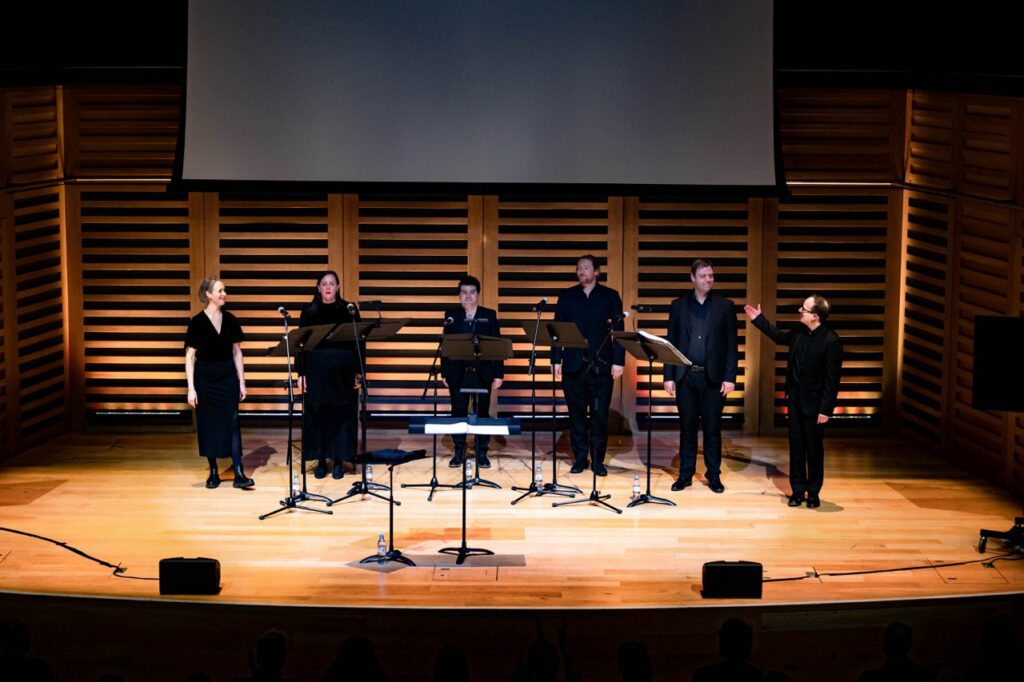
Despite being billed as an opera, “Russia: Today” has no apparent plot; instead, the material is framed as an hourlong Orthodox memorial service, moving from opening prayers through lamentation to a kind of peace. “There are many different layers to the piece, just as there are many different layers to Russia,” said Sergej Morozov, the director of “Russia: Today,” by phone. “From outside, we see this political, aggressive layer, but there are different layers hidden underneath.”
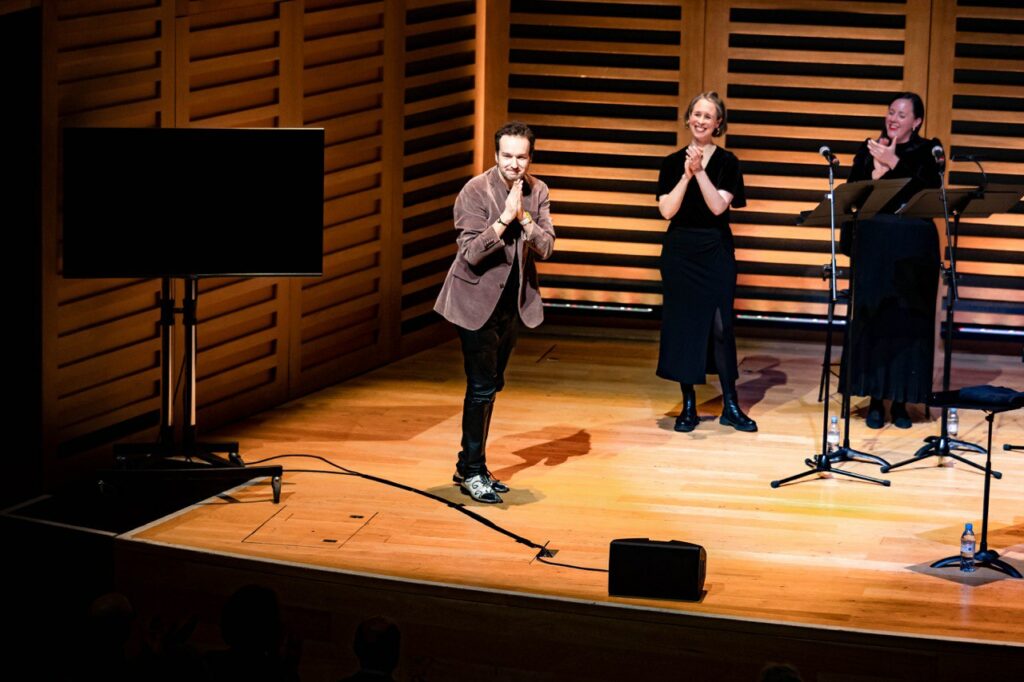
Birman himself left Russia with his family when he was six, in 1994, and grew up in San Francisco, before studying in Britain. As much as anything else, “Russia: Today” was an attempt to understand a country he often feels estranged from, he said. “I wanted to find what Russia is, because I didn’t have the answer myself.” In the version that will be performed in London, five singers are clustered around microphones beneath a screen that shows stark images of the Russian landscape shot by the filmmaker Alexandra Karelina.
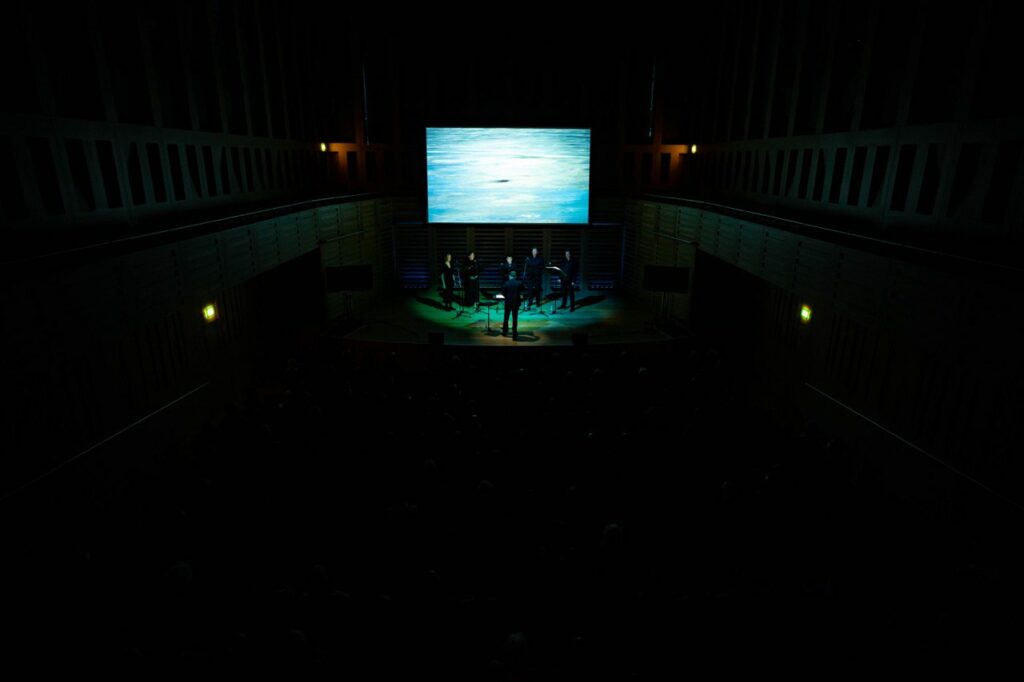
Snow-swathed railroad tracks and apartment blocks blur into glowering fir forests; vivid green tundra gives way to gray frozen lakes. We see no people, but we hear voices continually. Sometimes the interview recordings are played straight, or woven into cacophonous layers; other times, the words are declaimed verbatim by the performers, in Russian and English. At moments, Birman molds them into eerie, angular vocal lines. Coloring the score are the sounds of bells, whistling, birdlike cries and the growl of a low bass voice. Birman’s original idea was to present stagings of the work in Moscow and London. Plans were well advanced until summer 2021, when the singers of a Russian vocal ensemble that had agreed to premiere the piece, took a closer look at the text and pulled out. “The conductor just called me and said, ‘I’m so sorry, the singers don’t feel comfortable,’” said Tonya Wechsler, the show’s producer. “She said, ‘Look, one of them told me, ‘Do you not realize that it could be our last performance?’” Birman guessed that it was the religious element of “Russia: Today,” as much as its political overtones, that spooked the Moscow singers, given President Vladimir V. Putin’s alignment with the Russian Orthodox Church. “I think it was the appropriation of sacred music,” he said. “They feared that this would be problematic for their careers and their safety.” When another ensemble gave the first performance in September 2021 — in Narva, Estonia — some Russian-speaking audience members also made their displeasure felt. “We had a post-show discussion and some of the people there said, ‘Oh, it’s all lies, we cannot believe people actually said this,’” Wechsler said. Further attempts to get a live performance in Russia came to nothing. When a recording was screened in a Vladivostok movie theatre a few weeks later, the venue requested that it be shown without subtitles, in case photos of the text found their way onto social media. Given everything that’s happened since, could Birman see “Russia: Today” being performed in the country of his birth any time soon? He laughed. “Nobody’s going to touch this for as long as the current government is in,” he said. Even if he could visit Russia without risking the military draft, it would be impossible to repeat the fieldwork he did just a few years ago, Birman added. “Who’s going to be willing to talk about Russia in this way at this point? Who’s going to say anything honest?” When another ensemble gave the first performance in September 2021 — in Narva, Estonia — some Russian-speaking audience members also made their displeasure felt. “We had a post-show discussion and some of the people there said, ‘Oh, it’s all lies, we cannot believe people actually said this,’” Wechsler said. Further attempts to get a live performance in Russia came to nothing. When a recording was screened in a Vladivostok movie theatre a few weeks later, the venue requested that it be shown without subtitles, in case photos of the text found their way onto social media.
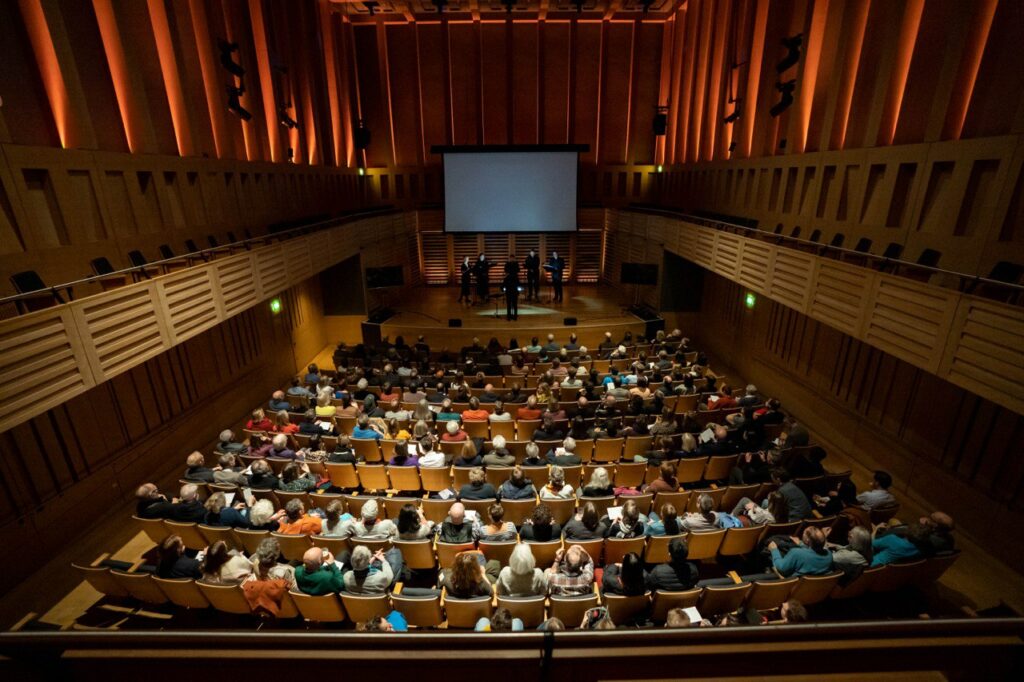
Given everything that’s happened since, could Birman see “Russia: Today” being performed in the country of his birth any time soon? He laughed. “Nobody’s going to touch this for as long as the current government is in,” he said. Even if he could visit Russia without risking the military draft, it would be impossible to repeat the fieldwork he did just a few years ago, Birman added. “Who’s going to be willing to talk about Russia in this way at this point? Who’s going to say anything honest?” Given everything that’s happened since, could Birman see “Russia: Today” being performed in the country of his birth any time soon? He laughed. “Nobody’s going to touch this for as long as the current government is in,” he said. Even if he could visit Russia without risking the military draft, it would be impossible to repeat the fieldwork he did just a few years ago, Birman added. “Who’s going to be willing to talk about Russia in this way at this point? Who’s going to say anything honest?”
‘What is Russia? What will it become?’ FT, Jan 7th, 2023-02-17
Eugene Birman The composer has turned the views of ordinary citizens into a documentary opera searching for answers. By Andrew Jack.
The political and economic partnership between Europe and Russia was already crumbling in 2017, but for composer Eugene Birman the continued cultural exchanges offered a tempting opportunity. Born on 1987 in Soviet Latvia but raised in Moscow before moving abroad with his family, he returned to the country to learn more about Russians’ views on their homelands and set his findings to music. The result is Russia : Today, a documentary opera juxtaposing video with singing inspired by his research. It premiered in the Estonian city of Narva, on the Russian border, in September 2021, and will be performed at Kings Place, London, in February by the Exaudi vocal ensemble, followed by a discussion at Pushkin House in April.
During trips to Moscow, Vladivostok, Riga and Helsinki, Birman collected more than 500 interviews with ordinary Russians and those living in neighbouring countries, seeking out their little-heard and sometimes suppressed but often premonitory private thoughts, which mix pride and insecurity, victimhood and impotence. “I travelled after the Russian occupation of Crimea, Donetsk and Luhansk [in2014], and the discussion at the time was: where will Russia attack next?” he recalls. “ We often hear the Russian propaganda machine and the western media trying to predict the future.. But, for me, what is interesting as an ex-Russian [resident] was what people in Russia believe.”
The composer, who left Moscow aged six in the mid-1990s when his parents emigrated to the US, sought out answers to these questions: “What is Russia What was Russia? Wat will it become?” Many of his interviewees, whom he does not name, were critical and pessimistic. One former dissident living in Finland refused even to be recorded. “The question of anonymity is very important, because your name was always known in Soviet times,” says Birman. Russia : Today includes extracts from his recorded interviews. The opinions of others form the basis of the libretto, written by Scott Diel. They are set to Birman’s requiem in the style of the Russian Orthodox panikhida, a prayer to repose the soul after death.
“The music is just a trick to get one to listen,” he says. The result is a powerful hour-long immersion in the complexities and contradictions of temporary Russia, with the quasu-religious multilingual chants at times reminiscent of Tuvan throat singers. “The music demands a lot of the musicians. Eugene really understands vocal sonority,” says James Weeks, Exaudi’s artistic director, who is bringing one Latvian singer to London to perform a particularly long, deep bass part. “Unlike a lot of contemporary composers, he doesn’t hold back emotionally. It’s very, very immediate.” The singing takes place against the potent backdrop of lingering countryside shots by Russian artist and photographer Alexandra Karelina. These evolve over the performance from harsh snow-covered plains to lush summer forests, lakes and trails. The images include a freshly broken ice hole pulsating with water before refreezing, and a spade digging into earth alive with ants. Karelina describes this as showing “life and activity in something we expect to be lifeless”.
In the wake of Russia war crimes in Ukraine and the discovery of mass graves, it feels more sinister. “My starting point was that Russia : Today is a place of some paradox and mystery that can be solved. Everything happening here has a certain reason,” says Karelina. “[But] in the end, there is no clear answer. Everything is going back to the beginning. It is the endless riddle. I wanted to find… archetypal Russian landscapes. This is a territory that has witnessed many different events and is able to absorb them entirely. This is where the mystery of the place comes from.” Birman already played with some of these delicate historical themes in a previous work in 2014. The Estonian National Male Choir sang his project 289, named after the League of Nations treaty document defining the border between the newly independent Estonia and the Soviet Union in the 1920s. He returned to Estonia for the premier of Russia : Today, choosing Narva for its symbolism as both one of the easternmost cities in the EU and arguably its most Russian one, with a large diaspora population and regular exchanges between the two countries.
Reactions to the 2021 performance were mixed. “It was probably the most uncomfortable post-concert feeling I’d ever had,” Birman recalls. “I thought people would deeply appreciate it, but in fact it was very complicated and unpredictable… Many people wanted and welcomed it; many more didn’t, and thought they were not ready. It touched everyone in various ways.” A recording of the documentary opera and its accompanying film were subsequently screened in Russia, including in Vladivostok, although the hosting arts institutions requested the removal of subtitles describing the libretto, for fear someone might take photos to use in a clampdown.
“It’s much harder to be held accountable for music [than writing],” says Birman. “The idea was to present this as an artwork, rather than a way of questioning the system of government. It was to give a voice to people who were never interviewed.” There were even plans for a performance of Russia : Today in Moscow and to take Russian singers abroad for performances in Europe. But neither ideas was practical after Vladimir Putin ordered the invasion of Ukraine. Prophetically and disturbingly, one of the final interviews in the performance is with a schoolgirl from Vladivostok talking to her mother. “Russia is the most awesome country,” she says. “Before we had Belarus, Ukraine. Yes. It used to be one country. Then some guy came – Yeltsin, I think – and broke everything up.” Still Birman remains optimistic. “The hope is that one day we can perform in Moscow and have a totally open discussion on what it means to be Russian.” Russia : Today will be performed at Kings Place on February 16th, kingsplace.co.uk, russiatoday.live.

